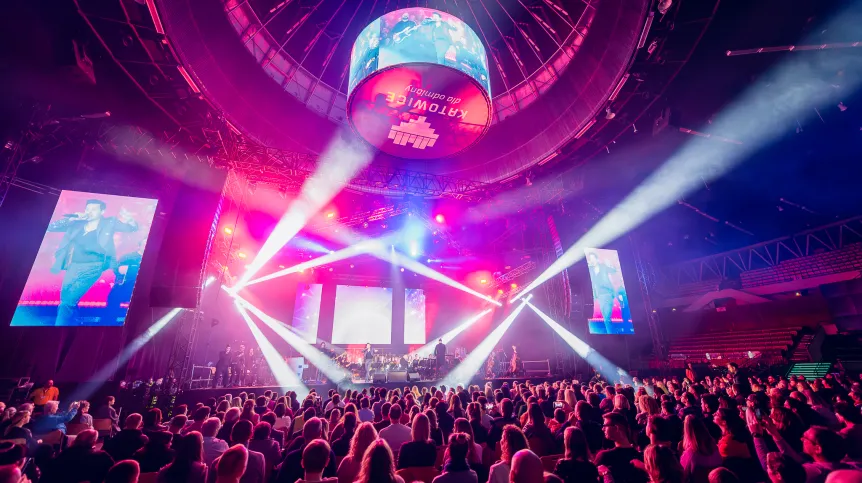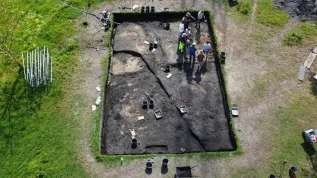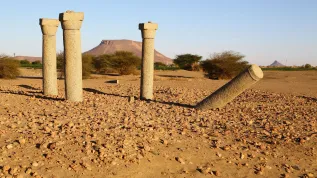
The music and acting show KATOPOLIS marked the official opening of the European City of Science Katowice 2024 last weekend. The title, given by EuroScience in cooperation with the European Commission, was awarded to a city from Central and Eastern Europe for the first time in history.
The show at Spodek in Katowice was opened by Professor Mike Berners-Lee, a world-renowned expert in the field of sustainable development and climate change, including carbon dioxide emission rates.
In a short speech, Professor Berners-Lee talked about the role of science in facing contemporary challenges, including the climate crisis, threats to biodiversity, pollution, and the need to combine the efforts of science with economics, politics and art to combat these threats.
The show included a number of performances, among them arrangements of the songs: Nim wstanie dzień performed by Edmund Fetting, Syreny by Artur Rojek and Psalm stojących w kolejce by Krystyna Prońko; Krzysztof Zalewski sang his Zabawa (and Mamona, originally by Republika), the band Mikromusic performed Operację na otwartym sercu and Julia Pietrucha sang Celina. Piotr Rogucki performed Vademecum skauta, and Mela Koteluk performed O, mój Śląsku, originally by Jan Kyks Skrzek.
The music was interspersed with anecdotal acting inserts, referring to the history of the region and its key science and cultural figures (Grażyna Bułka, Barbara Lubos, Izabella Malik, Marcin Gaweł and Wiesław Sławik performed).
Responses were also played of rectors of universities in the region and local government officials to humorously formulated questions about various ideas surrounding the European City of Science Katowice 2024.
Rector of the University of Silesia Professor Ryszard Koziołek, answering when Spodek would fly away, pointed out that it would happen when Silesians take off in their flight, which requires science, art, but also roots.
The show hosts were the director of the Silesian Theatre, Robert Talarczyk, and the director of the Korez Theatre, Mirosław Neinert. They spoke about Katowice, concluding that it was a city where people always came to see what the future would look like, they analysed the future of the metro in the Upper Silesian and Zagłębie Metropolis, and when considering moving the capital to Katowice, they joked that the Polish language could then be given the status of a regional language, and it would still have to wait twenty years for it.
The artistic director of KATOPOLIS was Miłosz 'Miuosh' Borycki, who collaborated with the Śląsk Song and Dance Ensemble, an orchestra and combined academic choirs. The people involved in preparing the show included: writer Zbigniew Rokita and director Jan Matuszyński.
KATOPOLIS took place on the first day of the 7th edition of the Silesian Science Festival, which this year is also the opening weekend of the European City of Science Katowice 2024. When announcing the event, the Silesian Science Festival director of ŚFN, Professor Ryszard Koziołek said that it would be a celebration of awarding the title to Katowice, but also an introduction to work on the implementation of next year's program.
The celebrations of the European City of Science Katowice 2024 will be built around five program paths. The main year-round program will be 50 thematic weeks of science for the public. Additionally, the following paths are planned: city-region-academy, the City of Science youth programme, the teachers-to-teachers educational programme, and special events.
The Katowice Academic Consortium - City of Science is responsible for preparing the ECSK 24 programme. It consists of seven regional public universities (59 thousand students, 1,8000 doctoral candidates, 747 fields and specialisations) cooperating with the local governments of Katowice and Silesia, and the Upper Silesianand Zagłębie Metropolis.
Before Katowice, the European Cities of Science were: Stockholm, Munich, Barcelona, Turin, Dublin, Copenhagen, Manchester, Toulouse, Trieste and Leiden. (PAP)
Mateusz Babak
mtb/ jann/ kap/
tr. RL













